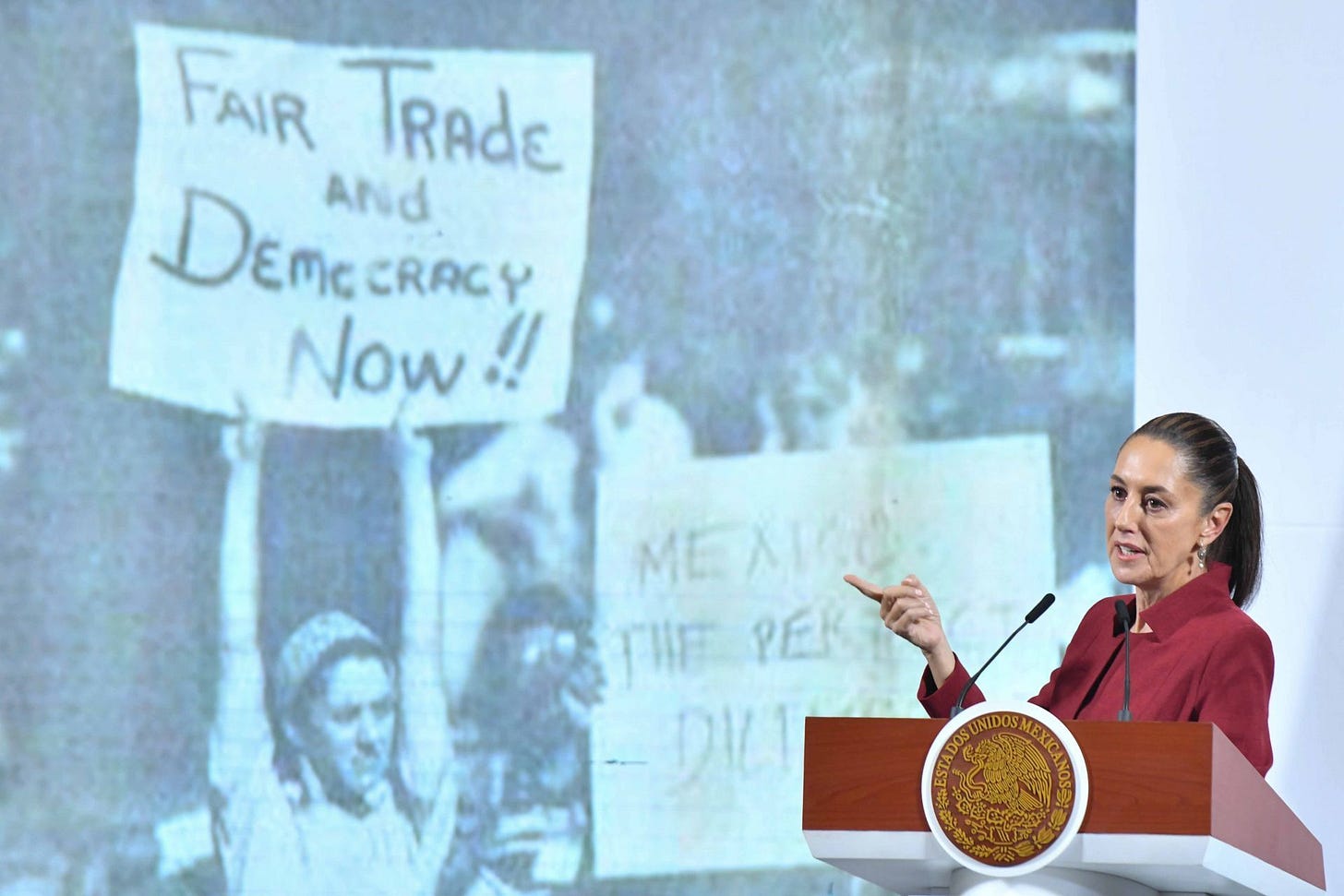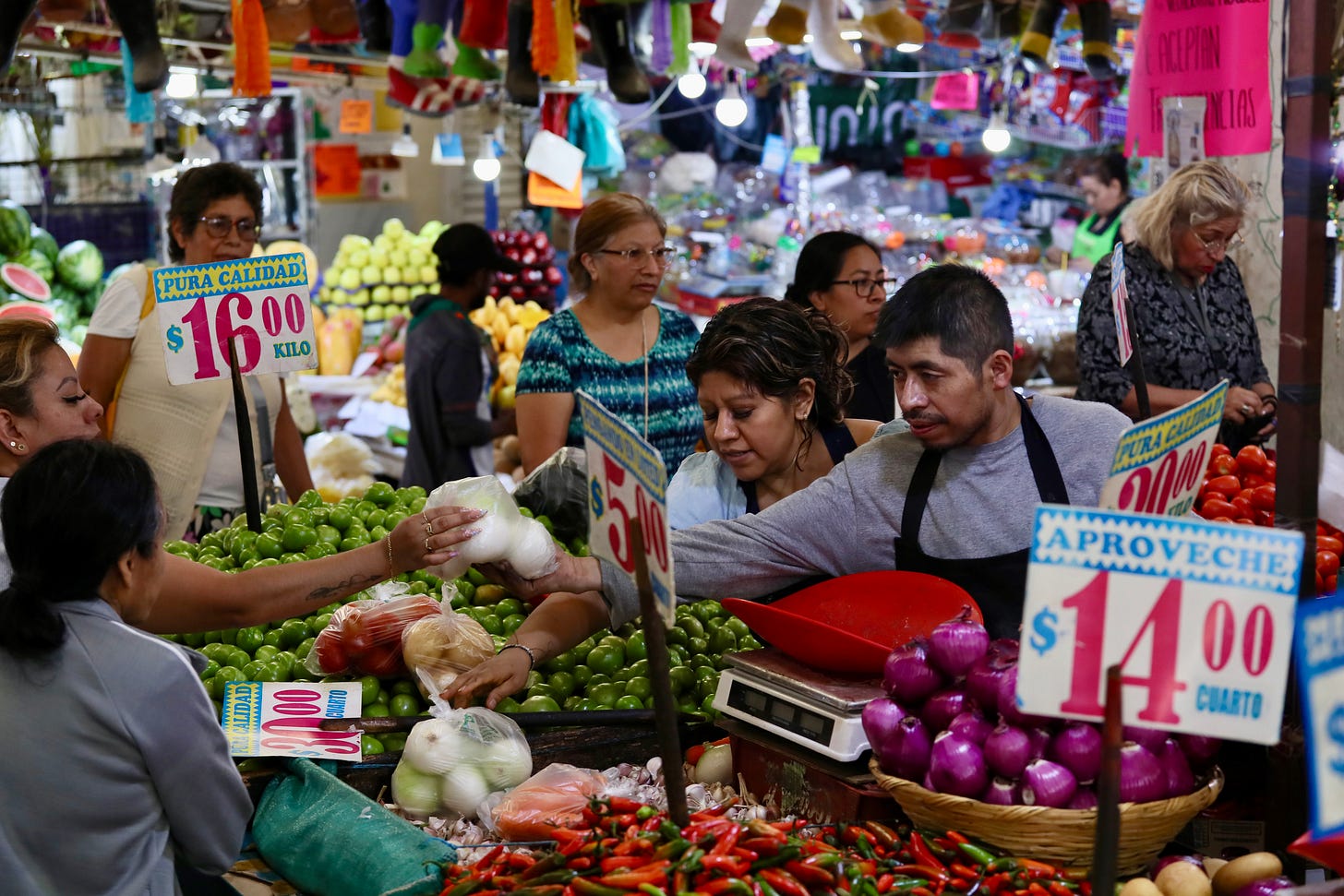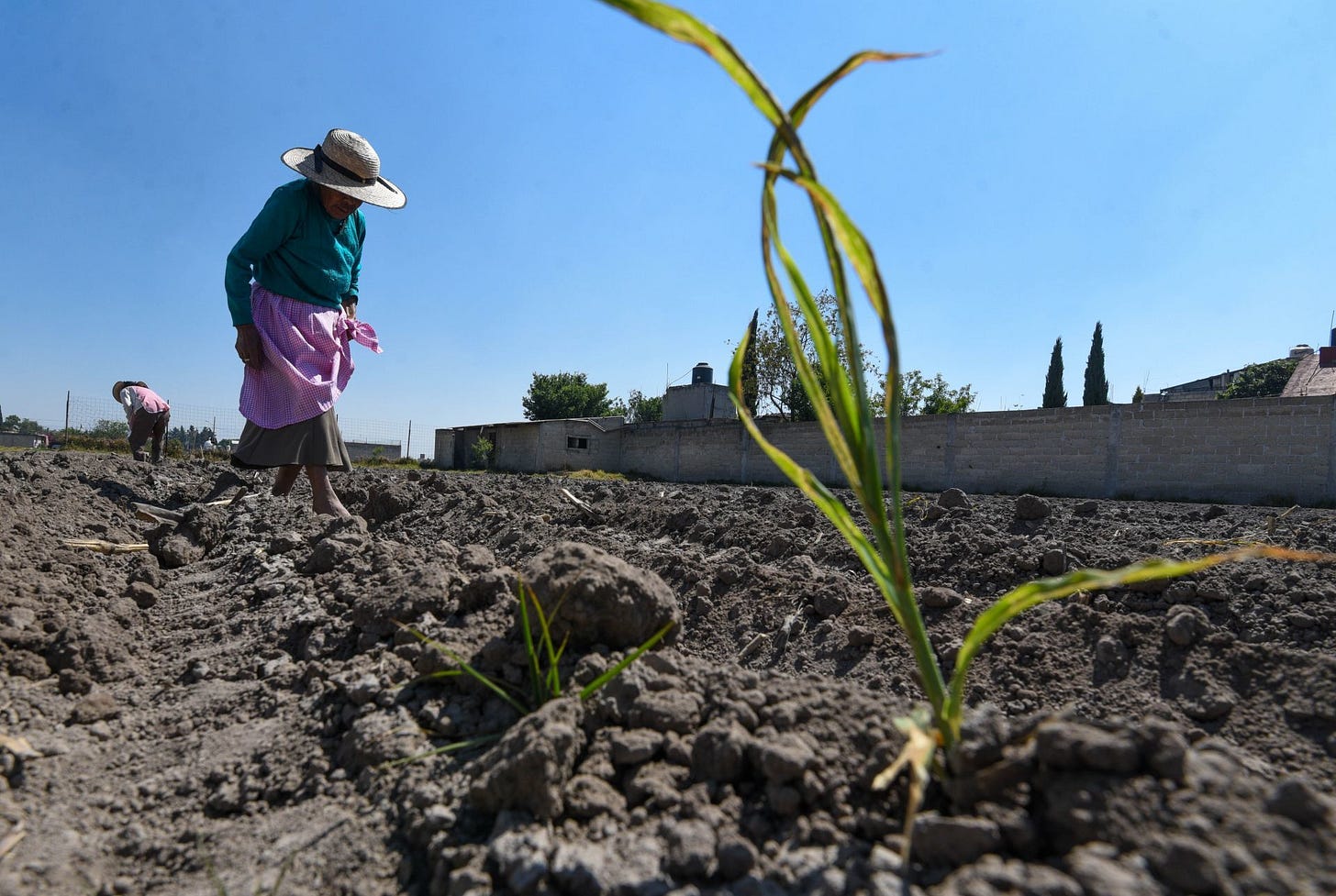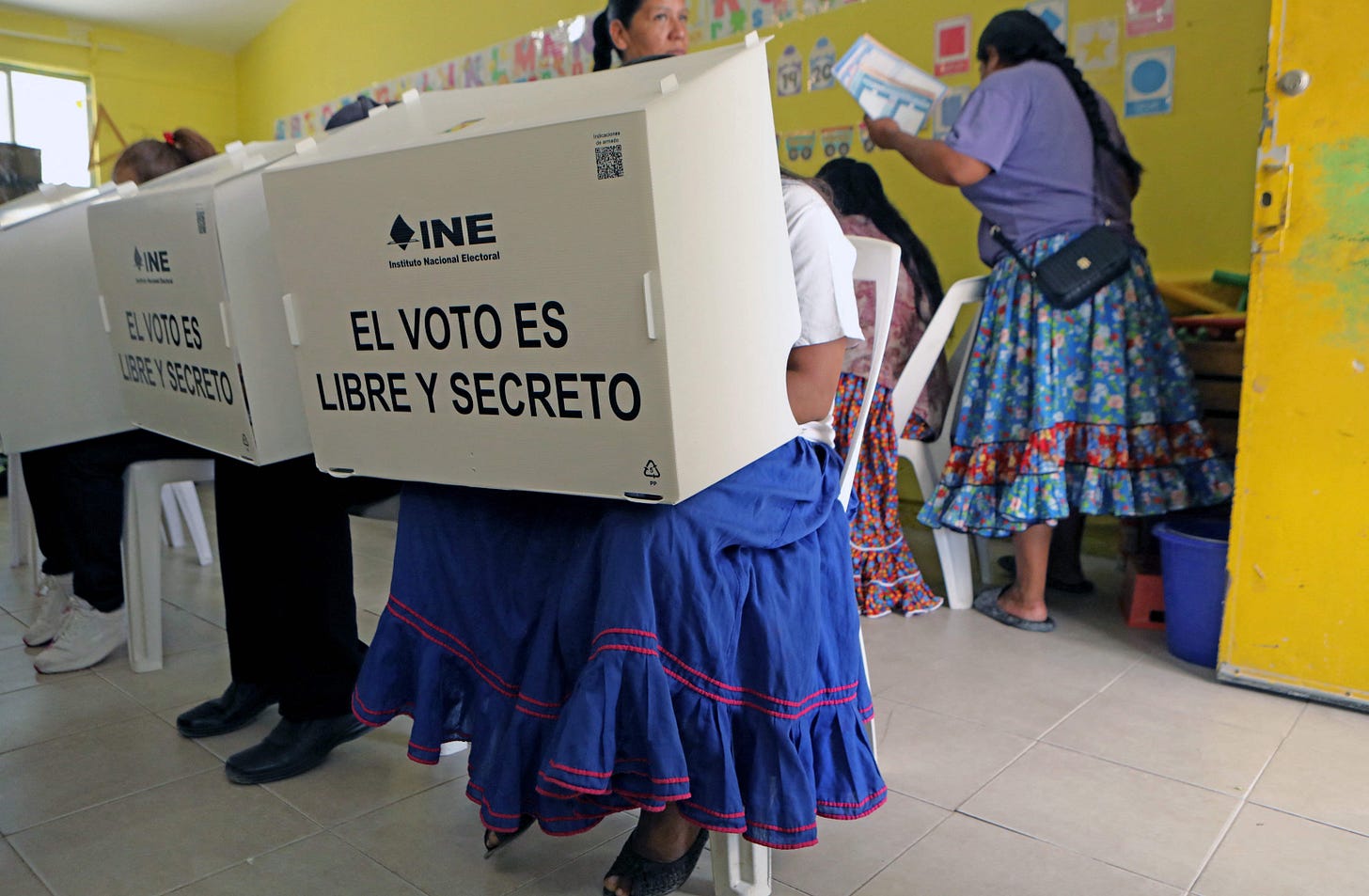06 June 25 | Mexico: A Model for the Americas?
Also: Prehispanic treasures reappear at the Met in New York. Photographer Meiselas: This is the era of the editor. Was money laundered through tequila? Latino support for Trump wavers in Texas.
Lea La Jornada Internacional en español aquí.
The Development Strategy of the Fourth Transformation
The Mexican government’s policies under the Fourth Transformation to raise the minimum wage and expand social programs for the most vulnerable has reduced the percentage of workers living in poverty in Mexico to a historic low. This is undoubtedly one of the reasons behind President Claudia Sheinbaum’s extraordinary approval rating, which exceeds 80 percent.
The Economic Commission for Latin America and the Caribbean (ECLAC) has described the “Mexico Plan” development strategy as an example of sustainable transformation. “It’s a very ambitious, very strong development plan—not just one focused on growth—it covers all areas,” explained Jorge Mario Martínez, director of ECLAC’s subregional headquarters, in an interview with La Jornada. In particular, he added, the plan sets a clear path with development hubs, each with regional specializations such as agribusiness or manufacturing. It also seeks to boost domestic supply chains and aims for 65 percent of public procurement to be products made in Mexico.
However, tariffs, threats to remittances, and economic slowdown—pressures largely coming from the north—pose risks to these gains and raise questions about future government strategies. In 2024, growth in the informal economy was more than three times the national GDP growth rate of 1.2 percent.
The government’s task is far from easy. Nationally, 31.7 percent of workers—about 44.2 million Mexicans—cannot afford a basic food basket for their entire household with their labor income. Among women, this figure rises to 35.9 percent. Nevertheless, according to official statistics, this is the lowest level of labor poverty on record, following a significant decline between 2018 and 2024.
"This significant reduction is mainly due to the increase of the minimum wage, labor measures, and social programs—especially the pension for older adults," said Luis F. Munguía, president of the National Minimum Wage Commission. In fact, the minimum wage has increased by 215 percent since 2018, when Andrés Manuel López Obrador took office, rising from 88.40 pesos to 278.90 pesos.
The question now is: what’s next? With the exception of Panama and the Dominican Republic, Latin America has seen over a decade of low growth. In particular, Mexico’s economic growth has averaged just 2 percent annually, and now ECLAC projects only 0.3 percent growth for this year.
The dramatic increase in the minimum wage and the social programs of the Fourth Transformation governments are more essential than ever in this economic moment. Tariffs and the economic policies of President Donald Trump are pushing Mexico’s growth forecasts into negative territory. Uncertainty and declining economic activity have also hit remittances, which just experienced their steepest drop since September 2012.
Meanwhile, Sheinbaum’s government continues efforts to heal some of the deep damage done by years of neoliberalism, including in rural development. For example, at the end of May, the Agrarian Attorney’s Office launched a new program to provide legal and technical support directly to the 25 million people living in ejidos (communal land holdings). This is particularly urgent because, in 2025, for the first time in 30 years, Mexico will not produce enough white corn—the key ingredient in masa and tortillas. And as the saying goes: “Without corn, there is no country.”

At the same time, uncertainty about the future of economic relations between the three countries of North America complicates the implementation of development strategies. The US president's actions have pitted workers and governments against each other, explains Manuel Pérez Rocha in La Jornada. "We must oppose Trump's tariffs that divide us. In our three countries, we want decent jobs, food systems, and healthy environments, and, as Sheinbaum preached when she was a student, 'fair trade with democracy.'" He adds: "The alternatives to the USMCA and other treaties, developed over decades through international solidarity, offer a real path to countering corporate power and building inclusive economies and constructive international relations. Social and civil organizations in the three countries are already coordinating."

The Quote
The moment we stop trying, we lose our humanity.
-Greta Thunberg
In case you missed it

◻️ Pre-Hispanic Mesoamerican treasures reappear at The Met in New York. After four years of renovation, the most prestigious museum in the United States reopens its Art of the Ancient Americas galleries with a new narrative that weaves together pre-Columbian cultures and breaks through temporal and spatial boundaries. In Mexico, the National Institute of Anthropology and History is stepping up efforts to recover cultural heritage. In Mexico City’s historic center, there are plans to open more “archaeological windows” - archeological spaces open to the public.
◻️ Meiselas: This is the era of the editor, when photographers must break the frame of their images. In a world saturated with photographs, curators are needed to help navigate the infinite sea, says Susan Meiselas, award-winning documentary photographer and president of the Magnum Foundation. She advises that photographers should move beyond simply capturing images to illustrate, and should look to connect with their subjects and offer context about where and how they live.
▶️ VIDEO

◻️ Mexico: New Supreme Court of Justice of the Nation. For the first time in Mexico’s history, the people decided who will serve as judges across all levels of the justice system—an unprecedented move globally. Only 13 percent of the population took part in the judicial elections, but the President emphasized that it was a successful first exercise: in practical terms, 13 million people—rather than a single individual—chose the judges (previously, the President nominated Supreme Court justices). Moreover, wrote La Jornada in an editorial, “it is worth celebrating as a milestone in the centuries-long Indigenous struggle for equity that a Mixtec lawyer has joined—and is very likely to preside over—the Supreme Court.” Still, debate continues over the implications of this electoral reform, notes journalist Julio Hernández López.
◻️ Sheinbaum rejects new U.S. offensive against Cuban doctors. The Mexican president responded forcefully to Washington’s decision to impose visa restrictions on Central American officials for allegedly “exploiting” Cuban doctors through “forced labor.” “There is a contract for Cuban doctors to collaborate in Mexico’s healthcare sector… It’s open and legal,” she stated. Cuban medical missions have provided care to more than 2.3 billion people in 165 countries over the past 60+ years.
◻️ Money laundering through tequila? Several Florida businessmen have filed a legal case against one of the former Genaro García Luna’s associates, accusing him of laundering at least $150,000 from the former Secretary of Public Security through a tequila company.
◻️ Latino support for Trump wavers on the Texas border. Trump won 55% of the Latino vote in Texas in November, but his harsh measures—including deporting minors and U.S. citizens—and trade policies are raising concerns in border communities, reports Alfredo Corchado in a special for La Jornada. “Mexico, Piedras Negras, is our lifeline, our blood,” Aaron Valdez told Corchado. “They’re more than neighbors. They’re family. When they suffer, we suffer more.”
◻️ The end of a global era: Boaventura de Sousa Santos. The Portuguese sociologist explains that for the first time in centuries, capitalism no longer has its foundation in the West—but in the East. In an interview with Miguel Ángel Velázquez, he stresses that “migration will be the dominant issue in the immediate and long-term future, because people are being forced to leave their lands... due to the temperatures resulting from climate change.”
◻️ Bellinghausen, a potter of stories. The new book by Hermann Bellinghausen, Mester de alfarería, is a collection from a master craftsman of tales—unique, necessary, and irregular narratives shaped like handmade clay pieces.
◻️ Carmen Parra, an essential artist. Emilio Payán writes that Parra “paints with the shape of the soul; in her dreamlike universe, baroque angels and archangels coexist with butterflies and flowers. Her art soars between past and present, where each brushstroke is a heartbeat of the nation that is reflected in her work.”
🎧 What we’re listening to
DONALTRON by Junior Caldera, Davicito59 and Luxor. One of the artists has been detained and is facing deportation after recording this song.





